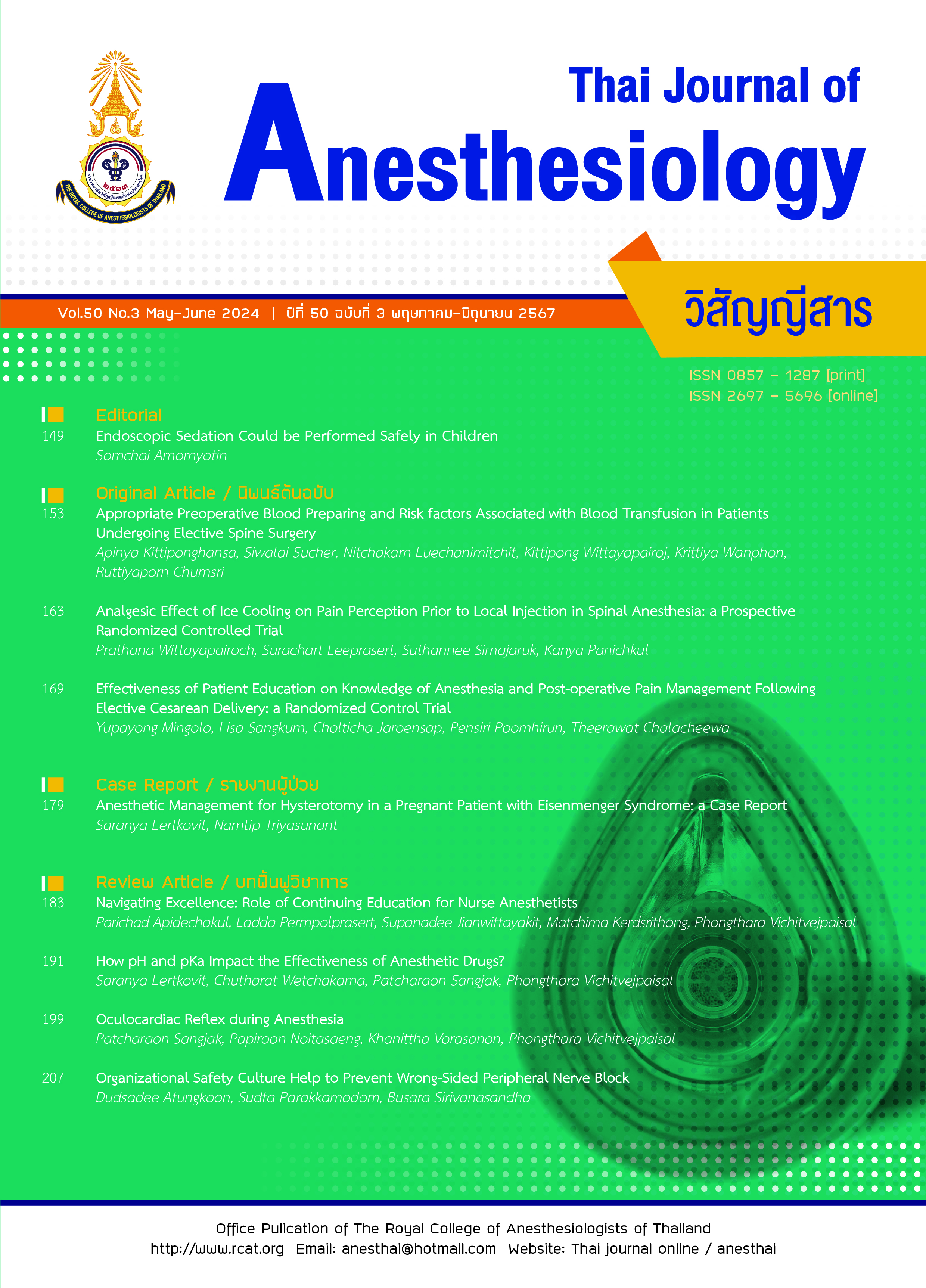Effectiveness of Patient Education on Knowledge of Anesthesia and Post-operative Pain Management Following Elective Cesarean Delivery: a Randomized Control Trial
Main Article Content
Abstract
Background: Patient education is a major concern for nurse anesthetists in perioperative setting. Preoperative education can enhance patient outcomes, reduce anxiety and improved satisfaction with the surgical experience. In the health care center, typical patient received pamphlets or verbal instructions from the physicians and nurses on the day before surgery, which is difficult to control the effectiveness of patient education. Therefore, our purpose of the study was to compare the perioperative knowledge between patient who received preoperative education program and standard of care, respectively. Methods: A hundred patients were randomly divided into preoperative education program (group 1) and standard of care group (group 2). Group 1 received preoperative education by nurse anesthetists. While group 2 received preoperative education by healthcare provider as a routine standard of care. The primary outcome was the pre- and post-education knowledge score. The secondary outcomes included anxiety score, postoperative pain outcomes and satisfaction score. Results: The patient knowledge were significantly greater in group 1 compare with group 2 (standard mean difference pre and post education: 2.72±1.83 vs 0.24±0.56 pointes, P<0.001 และ P=0.004). Amsterdam Preoperational Anxiety and Information Scale (P<0.001) and postoperative pain outcomes were statistically better in group 1 (rest pain: 0.5 (0-3) and 1 (0-3), P=0.001). However, the satisfaction score was comparable between the two groups. Conclusion: Preoperative education by nurse anesthetist could improve patient’s knowledge, as well as, reduced patient’s anxiety. However, it did not improve perioperative pain outcomes or satisfaction score.
Article Details

This work is licensed under a Creative Commons Attribution-NonCommercial-NoDerivatives 4.0 International License.
References
Department of Anesthesiology, Faculty of Medicine Ramathibodi Hospital. Annual report. Bangkok: Mahidol University; 2017-2022.
ชุลีพร วชิรธนากร, ปุณยนุช จุลนวล. ความต้องการข้อมูลและการได้รับข้อมูลของผู้ป่วยก่อนการผ่าตัดทางนรีเวช. วารสารคณะพยาบาลศาสตร์ มหาวิทยาลัยบูรพา. 2560;25:51-9.
Mitchell M. Conscious surgery: influence of environment on patient anxiety. J Adv Nurs. 2008;64:261-71.
อรทัย บุญเลิศ, แสงเทียน ธรรมลิขิตกุล. ความวิตกกังวลและต้องการข้อมูลของหญิงตั้งครรภ์ก่อนการผ่าตัดคลอดทางหน้าท้อง. วชิรเวชสาร. 2545;46:135-43.
อนุช จึงสมาน, กรวีร์ พสุธารชาติ. การศึกษาความรู้เกี่ยวกับวิสัญญีของผู้ป่วยก่อนเข้ารับการระงับความรู้สึกแผนกสูตินรีเวช โรงพยาบาลรามาธิบดี. วิสัญญีสาร. 2559;42:1-10.
Kunthonluxamee A, Pitimana-aree S, Luarujisawat P. Validity and Reliability of the Amsterdam
Preoperative Anxiety and Information Scale (APAIS); Thai version in adult Thai pre-operative patients. J Psychiatr Assoc Thai. 2009;54:83-92.
Cherel Q, Burey J, Rousset J, et al. Epidural analgesia information sessions provided by anesthetic nurses: impact on satisfaction and anxiety of parturient women a prospective sequential study. BMC Anesthesiol. 2022;22:105.
Niruthisard S, Sriprajittichai P, Sathonpanich S, Kukiatkulchai R, Tunprayoon A. A survey of
postoperative pain experience at King Chulalongkorn Memorial Hospital: patients’ perspective. Chula Med J. 2008;52:421-30.
Ranco M, Lona L, Fabbro C, Bulfone G, Palese A. Patient education outcomes in surgery: a systematic review from 2004 to 2010. Int J Evid Based Healthc. 2012;10:309-23.
Johansson K, Salantera S. Preoperative education for orthopedic patients: systematic. J Adv Nurs. 2005;50:212-23.
Che Y, Gao Y, Jing J, Kuang Y, Zhang M. Effects of an informational video about anesthesia on
pre- and post-elective cesarean section anxiety and recovery: a randomized controlled trial. Med Sci Monit. 2020;26:1-11.
Tom K, Phang PT. Effectiveness of the video medium to supplement preoperative patient education: a systematic review of the literature. Patient Educ Couns. 2022;105:1878-87.
Brezis M, Israel S, Weinstein-Birenshtock A, Pogoga P, Sharon A, Tauber R. Quality of informed consent for invasive procedures. Int J Qual Health Care. 2008;20:352-57.
Sherlock A, Brownie S. Patients’ recollection and understanding of informed consent: a literature review. ANZ J Surg. 2014;84:207-10.
Prajit J, Wanchai A, Suwannachat S. The effect of video media use in patient undergoing anesthesia for surgery on the patient knowledge and satisfaction with the media. J H Nsg Edu. 2020;26:45-57.
ศิริทิพย์ สงวนวงศ์วาน, กัลยา อุ่นรัตนะ. ประสิทธิผลของสื่อวีดีทัศน์ผสมภาพแอนนิเมชั่นให้ข้อมูลเตรียมความพร้อมสำหรับผู้ป่วยที่ได้ยาระงับความรู้สึกทางช่องน้ำไขสันหลังผสมยาแก้ปวดในการผ่าตัดคลอดทางหน้าท้อง โรงพยาบาลสรรพสิทธิประสงค์ อุบลราชธานี. วารสารวิชาการสาธารณสุข. 2562;28:488-98.
Watt-Watson J, Stevens B, Katz J, Costello J, Reid GJ, David T. Impact of preoperative education on pain outcomes after coronary artery bypass graft surgery. Pain. 2004;109:73-85.
Naqib D, Purvin M, Prasad R, et al. Quality improvement initiative to improve postoperative pain with a clinical pathway and nursing education program. Pain Manag Nurs. 2018;19:447-55.
ณัชพล เติมพรเลิศ, ปัญจภรณ์ วาลีประโคน. ผลของวีดีทัศน์สื่อความรู้ต่อการลดความวิตกกังวลในการรักษาทางจิตเวชด้วยไฟฟ้า. วารสารสมาคมจิตแพทย์แห่งประเทศไทย. 2563;65:153-66.


